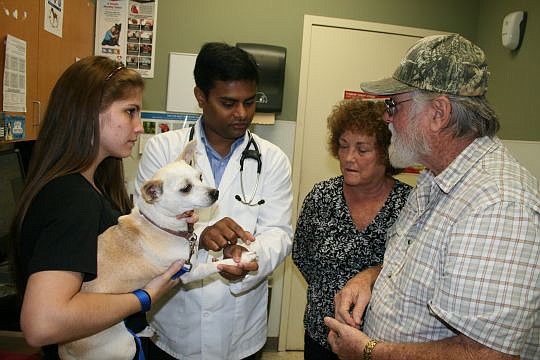
Dr. Ravi Putluru says needless animal euthanasia has troubled him for as long as he can remember.
He first encountered it while growing up in rural India, where farmers often couldn’t afford veterinary care for their cattle and other animals.
Many of his family’s friends were farmers who relied on healthy animals for their livelihoods.
“If the cow is not giving milk, the farmers don’t get their money,” Putluru said.
So, as a matter of economics, sick and injured animals would be routinely killed.
That’s when Putluru, now 38, got the notion of making a career of helping others care for their animals.
He studied veterinary medicine and practiced in India before obtaining a master’s degree in veterinary science at the University of Hawaii.
Working in an emergency facility for small animals in Hawaii, he saw it again: Pet owners deciding on euthanasia because they couldn’t afford veterinary care.
Financial wherewithal, Putluru insists, should not be a factor in whether a beloved pet lives or dies.
“It is very disturbing,” he said. “And often unnecessary.”
In 2008, Putluru’s desire to live in the United States’ mainland led him to interview for the surgical director position at Jacksonville’s First Coast No More Homeless Pets.
Offering free, low-cost spaying and neutering services is a key component of the nonprofit’s lifesaving efforts.
First Coast No More Homeless Pets began in 2001 when founder Rick DuCharme developed the SpayJax program. In 2009, the nonprofit opened one of the country’s largest spay-and-neuter facilities on Norwood Avenue on the Northside, where it averages 2,500 surgeries monthly.
It was a great fit for Putluru. “I really liked the mission,” he said.
After a year on the job, Putluru opted to advance his medical aptitude by taking a job as lead veterinarian at a Jacksonville animal hospital.
“There, I learned a lot of medicine. But at the same time, I witnessed a lot of unnecessary euthanasia,” he said.
Putluru’s yearning to make more of a difference — particularly, to help financially challenged pet owners extend the lives of their animals — was answered in 2004 when First Coast No More Homeless Pets needed a full-time medical director.
“I talked to Rick about what I thought I could do to help and came back here to work,” he said.
Now, virtually everyone in Jacksonville in need of veterinary services for their pets can receive low-cost services from First Coast No More Homeless Pets.
The organization treats dogs and cats that are people’s pets, feral cats and animals without owners through its Angel Fund.
Putluru said the nonprofit makes veterinary care affordable by offering services at about half of the cost of traditional clinics.
Also, financing is available to everyone able to pay 30 percent of the bill upfront.
The organization’s efforts have dramatically reduced the number of shelter deaths in Jacksonville and have been modeled by communities throughout the United States.
On April 15, it will open a second, larger facility on Cassat Avenue on the Westside, where Putluru said the organization expects to provide veterinary, surgical and dental care services to about three times the number of clients it now serves.
The new facility will have 12 exam rooms; the Norwood Avenue facility has four.
Meanwhile, three veterinarians, 10 veterinary technicians and five front-desk workers are being added to the nonprofit’s staff, Putluru said.
The more the organization grows, the more it is able to prevent the practice of financial decisions driving whether a pet is euthanized.
“People who are used to waiting will no longer have to wait. Everyone will be much better served,” he said.
Compassionate staff members are a key to First Coast No More Homeless Pets’ success.
Putluru said the organization carefully screens applicants and emphasizes work ethic and customer service during training.
“We are always saying during our morning huddles, ‘Hey, we don’t care if you don’t know everything, but we want you to be friendly and work as a team member,’” Putluru said.
Among the veterinarians at First Coast No More Homeless Pets is Putluru’s wife, Srivani Yarlagadda. They have an infant daughter, Ananya, and an 18-pound Maine Coon cat, Oreo.
“In 2011, Oreo just walked into our home and decided that’s his house,” Putluru said.
Meanwhile, Putluru says career-wise, he’s settled in at First Coast No More Homeless Pets.
“This is the right place for me to make a difference,” he said.